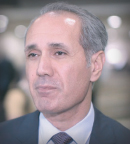Elranatamab Induces Responses in Many Patients With Resistant Multiple Myeloma in Phase II Trial

The promise of bispecific monoclonal antibodies in multiple myeloma continues to heighten as yet another one appears to be active. In a study reported at the 2022 American Society of Hematology (ASH) Annual Meeting and Exposition,1 almost two-thirds of patients with triple-refractory disease who were naive to treatments targeting B-cell maturation antigen (BCMA) responded to the anti-CD3/BCMA bispecific antibody elranatamab in the phase II MagnetisMM-3 trial.

Nizar Jacques Bahlis, MD
“Elranatamab is very efficacious and well tolerated in patients with relapsed or refractory multiple myeloma. The overall response rate is high at 61%, and responses were early, deep, and durable,” said Nizar Jacques Bahlis, MD, Associate Professor of Medicine, Arnie Charbonneau Cancer Institute, University of Calgary, Canada.
Also reported at the meeting were updated results for the 55 patients in the ongoing phase I MagnetisMM-1 trial.2 Almost one-quarter of the population had received prior BCMA-targeting treatment, and 54% of this subset responded to elranatamab. “Elranatamab induced durable clinical and molecular responses,” said Noopur S. Raje, MD, Director of the Center for Multiple Myeloma, Massachusetts General Hospital, Boston, and Professor of Medicine at Harvard Medical School.
Elranatamab targets both BCMA-expressing myeloma cells and CD3-expressing T cells, activating T cells and causing myeloma cell death. In November 2022, the U.S. Food and Drug Administration granted elranatamab Breakthrough Therapy designation.

Some of these responses [in the phase I MagnetisMM-1 trial] were very sustained, with patients continuing on elranatamab as we speak.— Noopur S. Raje, MD
Tweet this quote
The results of these studies, said Dr. Bahlis, “support the expansion of the MagnetisMM program to evaluate elranatamab alone and in combination with other drugs.”
MagnetisMM-3 Update
MagnetisMM-3 is evaluating elranatamab in 123 patients with no prior BMCA-directed treatment and in 64 patients with prior BMCA-directed treatment. Dr. Bahlis presented the results for the BMCA-naive group, of whom 97% were triple-refractory, 42% were refractory to five classes, and 32% had extramedullary disease. Patients received step-up doses of 12 mg, given subcutaneously, on day 1 and 32 mg on day 4 of week 1, then 76 mg weekly for six cycles, and after six cycles, patients who were in partial remission or better were allowed to transition to treatment every 2 weeks.
At a median follow-up of 10.4 months, 48% of patients had been treated for at least 6 months. By blinded independent review, 61.0% of patients responded, 55.2% achieved a very good partial responses or better, and 27.6% achieved a complete or stringent complete response. Of the 22 patients in complete remission, 90.9% achieved measurable residual disease (MRD) negativity. At data cutoff, 77.3% of responses were ongoing, and the median duration of response was not yet reached.
Median progression-free and overall survival also have not been reached. At 9 months, 84.4% of responses were ongoing, the progression-free survival rate was 63.0%, and the overall survival rate was 70.3%, Dr. Bahlis reported.
MagnetisMM-1 Update
In the phase I MagnetisMM-1 study, 55 patients received elranatamab monotherapy at doses from 215 to 1,000 μg/kg, given subcutaneously either weekly or every 2 weeks. At a median duration of follow-up of 12 months, the confirmed objective response rate was 64%, and the complete/stringent complete response rate was 38%. In patients with prior BCMA-directed therapy, 54% achieved responses, Dr. Raje reported. “Some of these responses were very sustained, with patients continuing on elranatamab as we speak,” she added.
The median duration of response was 17.1 months, and median progression-free survival was 11.8 months. All 13 patients with complete or stringent complete responses achieved MRD negativity, which was maintained for more than 1 year in almost one-third. Of note, reductions in soluble BCMA were observed over time in responding patients, Dr. Raje added.
KEY POINTS
- The bispecific monoclonal antibody elranatamab targets B-cell maturation antigen (BCMA)and CD3 receptors on myeloma cells.
- In the phase II MagnetisMM-3 trial, the response rate among heavily pretreated (but not with BCMA-targeted therapy) patients was 61%.
- In the phase I MagnetisMM-1 trial, which included patients with prior anti-BCMA treatment, the response rate was 64%, and 54% of patients with prior anti-BCMA treatment responded.
Toxicities of Interest
Step-up priming plus premedication appeared to mitigate the risk for cytokine-release syndrome. Cytokine-release syndrome was reported in 56% of patients in MagnetisMM-3, which had a 12/32 mg step-up dose, and all were grade 1 or 2. Immune effector cell–associated neurotoxicity syndrome (ICANS) occurred in 3.4% of patients, and also all were low grade. These conditions mostly resolved within 2 days and did not lead to treatment discontinuation. “The profile was predictable, and the events occurred early,” Dr. Bahlis said.
In MagnetisMM-01, low-grade cytokine-release syndrome was observed in 87%, and with the 44-mg step-up dose the incidence dropped to 67%. There were no cases of ICANS. Dr. Raje noted that treatment was associated with “significant” neutropenia (75% grade 3 or 4) but was manageable with appropriate supportive care.
Infections were reported in 67% of patients in MagenetisMM-03, of which 35% were grade 3 or 4. The median time to first onset was 47 days. COVID-19 infections were reported in 31 patients (25%), and two patients died as a result (both considered unrelated to elranatamab). Eight patients (6.5%) developed an infection that led to permanent discontinuation of elranatamab. Overall, 41% of patients received intravenous immunoglobulin during the study, Dr. Bahlis said.
DISCLOSURE: Dr. Bahlis has received honoraria or consulting fees from Celgene, Takeda, Karyopharm, Janssen, GlaxoSmithKline, Sanofi, Genentech, Forus, Pfizer, AbbVie, and Amgen. Dr. Raje has reported financial relationships with Bristol Myers Squibb, Celgene, Janssen, Pfizer, Sanofi, Amgen, Caribou Biosciences, Immuneel, Research to Practice, and Medscape.
REFERENCES
1. Bahlis NJ, Tomasson MH, Mohty M, et al: Efficacy and safety of elranatamab in patients with relapsed/refractory multiple myeloma naive to B-cell maturation antigen (BCMA)-directed therapies. 2022 ASH Annual Meeting and Exposition. Abstract 159. Presented December 10, 2022.
2. Raje N, Bahlis NJ, Costello C, et al: Elranatamab, a BCMA targeted T-cell engaging bispecific antibody, induces durable clinical and molecular responses for patients with relapsed or refractory multiple myeloma. 2022 ASH Annual Meeting and Exposition. Abstract 158. Presented December 10, 2022.
Related Articles
Expert Point of View: Urvi A. Shah, MD
Urvi A. Shah, MD, Assistant Attending at Memorial Sloan Kettering Cancer Center and Assistant Professor at Weill Cornell Medicine, New York, moderated the session where the MagnetisMM trial updates1,2 were reported and was interviewed by The ASCO Post.

Urvi A. Shah, MD
Elranatamab vs...
